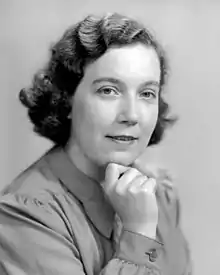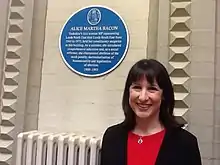Alice Bacon, Baroness Bacon
Alice Martha Bacon, Baroness Bacon, CBE, PC (10 September 1909 – 24 March 1993) was a British Labour Party politician born in Normanton, West Yorkshire.[1]
The Baroness Bacon | |
|---|---|
 | |
| Chair of the Labour Party | |
| In office 1950–1951 | |
| Prime Minister | Clement Attlee |
| Preceded by | Sam Watson |
| Succeeded by | Harry Earnshaw |
| Member of Parliament for Leeds South East | |
| In office 26 May 1955 – 29 May 1970 | |
| Preceded by | Denis Healey |
| Succeeded by | Stan Cohen |
| Member of Parliament for Leeds North East | |
| In office 5 July 1945 – 6 May 1955 | |
| Preceded by | John Craik-Henderson |
| Succeeded by | Osbert Peake |
| Personal details | |
| Born | 10 September 1909 Normanton, West Yorkshire |
| Died | 24 March 1993 (aged 83) |
| Political party | Labour |
Early life and education
Bacon's father was secretary of the Whitwood branch of the National Union of Mineworkers and the family joined in local campaigns to alleviate poverty.[2] She was educated at Normanton Girls' High School and Stockwell Teachers' Training College, before becoming a schoolteacher.[2]
Political career
Bacon delivered her first political speech at the age of 16,[3] when she also joined the Labour Party. In 1935, she became as Labour's League of Youth delegate to the Socialist Youth International Conference. Bacon was active in the National Union of Teachers and became president of its West Yorkshire division in 1944.[2]
In 1938, Bacon was selected as the candidate for Leeds North East, for which she became the MP in the 1945 general election, as the city's first woman MP.[2] When constituency boundaries were revised for the 1955 general election, she transferred to Leeds South East constituency and served it as MP until she retired in 1970.[2]
Bacon was on the Labour Party's National Executive Committee from 1941 until 1970, and chaired it in 1950–1951. In the 1953 Coronation Honours she was appointed a CBE.[4]
When Labour returned to government in 1964, Bacon became a Minister of State at the Home Office up to 1967, serving under Frank Soskice and Roy Jenkins in a period of liberalising reforms. She was appointed to the Privy Council in 1966. From 1967 to 1970 she was Minister of State at the Department of Education and Science, where she campaigned for comprehensive education.[2]
On her retirement from the House of Commons, Bacon was created on 14 October 1970 Baroness Bacon of the City of Leeds and of Normanton in the West Riding of Yorkshire.[5]
The MP Rachel Reeves published Alice in Westminster: The Political Life of Alice Bacon in 2019 (I.B. Tauris).[6] Reeves writes of Bacon that she "was a pioneer in the world of education and politics whose success was founded on her determination to stay true to her working-class roots and the people she came into politics to serve", and that we owe her a debt for her commitment to comprehensive education.[6]
Memorial
A Leeds Civic Trust Blue Plaque was unveiled by Rachel Reeves in 2019 in Leeds Corn Exchange.

References
- Reeves, Rachel; Carr, Richard (2017), Alice in Westminster: The Political Life of Alice Bacon, London: I. B. taurus & Co. Ltd, ISBN 978-1-78453-768-5
- Thornton, David (2021). Leeds: A Biographical Dictionary. Beecroft Publications. p. 15.
- Stead, Jean (16 November 1964). "Woman in Whitehall". The Guardian. p. 6.
- "No. 39863". The London Gazette (Supplement). 1 June 1953. p. 2953.
- "No. 45216". The London Gazette. 20 October 1970. pp. 11472–11473.
- Reeves, Rachel (27 November 2016). "We owe a debt to Labour's bold, pioneering Alice Bacon". The Guardian. Retrieved 27 October 2023.